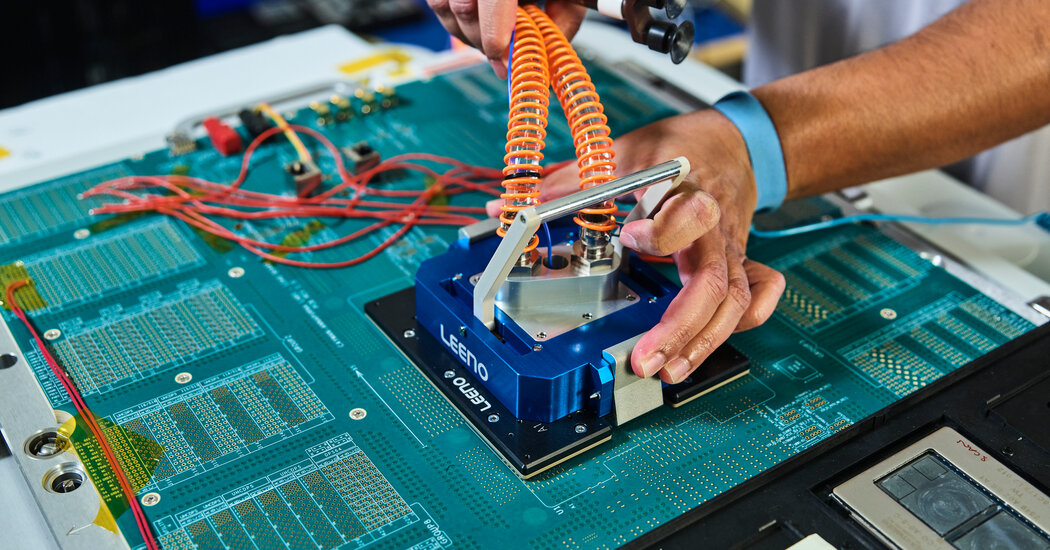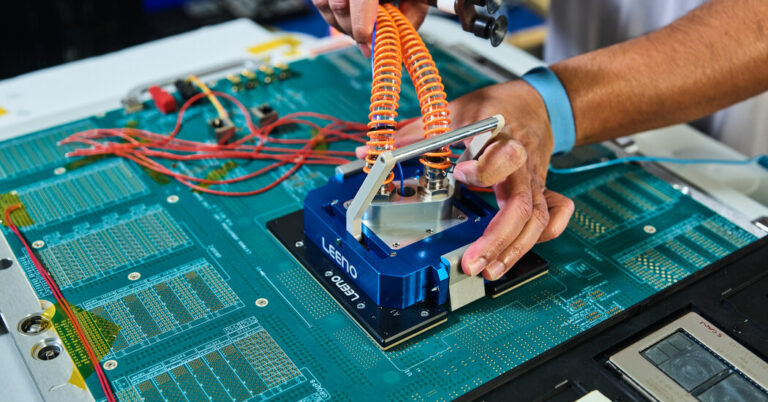The Biden administration on Monday issued sweeping rules regulating how artificial intelligence chips and models can be shared with foreign countries, in an effort to create a global framework that will guide the spread of artificial intelligence around the world for years to come.
With the power of artificial intelligence growing rapidly, the Biden administration has said the rules are needed to keep a transformative technology under the control of the United States and its allies, and out of the hands of adversaries who could use it to enhance its armies, carry out cyberattack operations, and otherwise threaten the United States.
Tech companies have protested the new rules, saying they threaten their sales and the future prospects of the American tech industry.
The rules place various limitations on the number of AI chips companies can send to different countries, essentially dividing the world into three categories. The United States and 18 of its closest partners – including Britain, Canada, Germany, Japan, South Korea and Taiwan – are exempt from any restrictions and can freely purchase AI chips.
Countries that are already subject to the US arms embargo, such as China and Russia, will continue to face the previously existing ban on the purchase of AI chips.
All other nations – most of the world – will be subject to limits that limit the number of AI chips that can be imported, although countries and companies can increase that number by entering into special agreements with the US government. The rules could irk some foreign governments: Even countries that are close trading partners or military allies of the United States, such as Mexico, Switzerland, Poland or Israel, will face restrictions on their ability to buy larger quantities of American artificial intelligence products.
The rules aim to prevent China from obtaining the technology it needs to produce artificial intelligence from other countries, after the United States banned such sales to China in recent years.
But the regulations also have broader goals: to make allied countries the place of choice for companies to build the world’s largest data centers, in an effort to keep the most advanced artificial intelligence models within the borders of the United States and of its partners.
Governments around the world, particularly in the Middle East, are pouring money into attracting and building massive data centers in a bid to become the next center for AI development.
Jake Sullivan, President Biden’s national security adviser, told reporters Sunday that the rule would ensure that the infrastructure for training the most advanced artificial intelligence is located in the United States or in the jurisdiction of close allies, and that “that capacity is not relocated”. like chips, batteries and other industries that we have had to invest hundreds of billions of dollars to bring back to shore.”
Sullivan said the rule would provide “greater clarity to our international partners and industry,” while countering national security threats from bad actors who could use “American technologies against us.”
It will be up to the Trump administration to decide whether to keep the new rules or how to enforce them. In a call with reporters Sunday, Biden administration officials said the rules had bipartisan support and that they were in consultation with the incoming administration about them.
Although Chinese companies have started to develop their own AI chips, the global market for such semiconductors is dominated by US companies, especially Nvidia. This dominant position has given the US government the ability to regulate the flow of AI technology around the world, limiting the exports of US companies.
Companies have protested these limitations, saying the restrictions could hamper harmless or even beneficial types of computers, anger U.S. allies, and ultimately push global buyers to buy non-American products, such as those made by China .
In a statement, Ned Finkle, Nvidia’s vice president for government affairs, called the rule “unprecedented and misleading” and said it “threatens to derail innovation and economic growth around the world.”
“Rather than mitigate any threat, the new Biden rules would only weaken America’s global competitiveness, undermining the innovation that has kept the United States ahead,” he said. Nvidia shares fell nearly 3% in premarket trading Monday.
Brad Smith, Microsoft’s president, said in a statement that the company is confident it can “fully comply with the high security standards of this rule and meet the technological needs of the countries and customers around the world who rely on us.” .
In a letter to congressional leadership on Sunday and seen by The New York Times, Jason Oxman, president of the Information Technology Industry Council, a group representing technology companies, called on Congress to step in and use its authority to reverse the action if the Trump administration does not.
John Neuffer, president of the Semiconductor Industry Association, said his group is “deeply disappointed that a policy change of this scale and impact is being hastily implemented just days before a presidential transition and without any meaningful input from the industry ”.
“The stakes are high and the time is difficult,” Neuffer added.
The rules, which run more than 200 pages, also establish a system in which companies that operate data centers, such as Microsoft and Google, can apply for special government accreditations.
In exchange for meeting certain security standards, these companies can then trade AI chips more freely around the world. Companies will still have to agree to keep 75% of their total AI-based computing power in the United States or allied countries and to locate no more than 7% of their computing power in any other nation.
The rules also establish the first checks on weights for AI models, the parameters unique to each model that determine how the AI makes its predictions. Companies setting up data centers overseas will be required to adopt security standards to protect this intellectual property and prevent adversaries from accessing it.
Governments facing restrictions can increase the number of AI chips they can freely import by signing agreements with the US government, in which they would agree to align with US goals for protecting AI
At the direction of the US government, Microsoft made a deal last year to partner with an Emirati company, G42, in exchange for G42 eliminating Huawei equipment from its systems and taking other measures .
The Biden administration could issue additional rules related to chips and AI in the coming days, including an executive order to encourage domestic energy production for data centers, and new rules that aim to keep cutting-edge chips out from China, as stated by some experts. the resolutions said.
This latest rule comes in response to an incident last year in which US officials discovered that Huawei, the sanctioned Chinese telecommunications company, had obtained components for its AI chips made by a major Taiwanese chip company, in violation of controls on US exports.
The announcements are part of a series of new regulations the Biden administration is rushing to issue ahead of the presidential turnover, in an effort to fill gaps and cement its legacy of countering China’s technological development. The administration issued new limits on exports of chip-making equipment to China and other countries, proposed new restrictions on Chinese drones, added new Chinese companies to a military blacklist, and rushed to finalize new subsidies for chip manufacturing in the United States.
But the AI rules issued Monday appear to be among the most sweeping and consequential of these actions. Artificial intelligence is rapidly transforming the way scientists carry out research, the way companies distribute tasks among their employees, and the way militaries operate. While AI has many beneficial uses, U.S. officials are increasingly concerned that it could enable the development of new weapons, help countries surveil dissidents and otherwise upset the global balance of power.
Jimmy Goodrich, senior advisor for technology analysis at the RAND Corporation, said the rules would create a framework to protect U.S. security interests while still allowing companies to compete abroad. “They are also forward-thinking, seeking to preserve supply chains led by the United States and its allies before they are passed on to the highest subsidy bidder,” he said.





